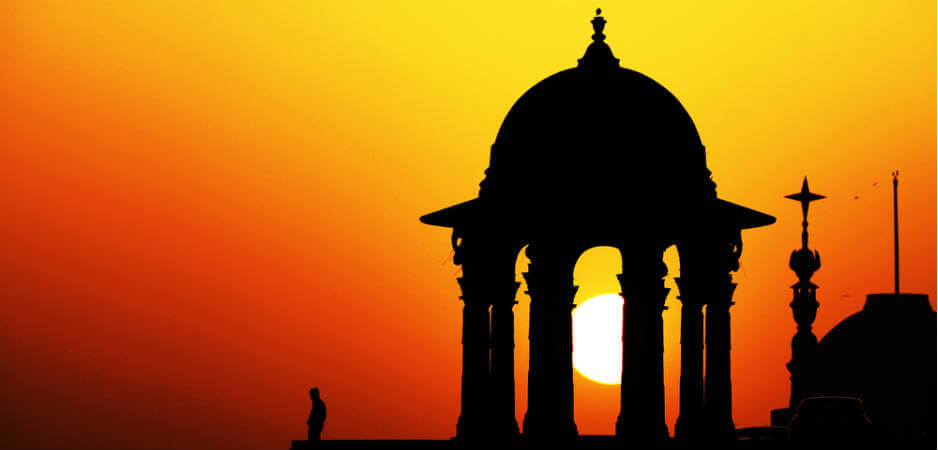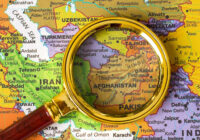Given India’s increasingly close ties with the US, the unpredictability of Trump’s foreign policy may well pose a major challenge to New Delhi.
As India expands its strategic and economic ties with the Gulf Cooperation Council (GCC) and with Israel, New Delhi is also seeking to strengthen its ties with Tehran. The Iran nuclear deal, formally known as the Joint Comprehensive Plan of Action (JCPOA), signed by Tehran and six global powers in 2015, created new opportunities for New Delhi in the country, especially since Iran is India’s potential gateway to Afghanistan and Central Asia.
During his 2016 visit to Iran, Indian Prime Minister Narendra Modi signed not only an agreement committing $500 million in financial assistance for phase one of the development of the Chabahar project, but also a three-nation agreement between India, Iran and Afghanistan to establish a land transit and trade corridor. India will build a 310-mile rail line from Iran’s Chabahar Port on the Indian Ocean to the city of Zahedan in southeastern Iran, close to the border of Afghanistan. India’s cost of this portion of the transit corridor will be $1.6 billion. Modi declared that the corridor “will open new routes for India, Iran, and Afghanistan to connect among themselves.”
India’s main goal has been to secure access to Afghanistan and Central Asia. Pakistan has continuously opposed India’s entry into the Afghanistan-Pakistan Transit Trade Agreement (APTTA), even though Afghanistan has been in favor of India joining it. Currently, Afghan goods can enter India, but trucks stop at Wagah (on the Pakistani side of the border). India, however, has been deprived of land access to Afghanistan and Central Asia.
There have been some impediments to the Chabahar project actually getting underway by 2018. The companies that were due to develop customized equipment jetties and container terminals were not willing to take part in the bidding process as banks were not ready to facilitate financial transactions involving Iran due to the uncertain policies of US President Donald Trump’s administration toward the Islamic Republic. Furthermore, there was a delay in loan disbursement of $150 million, and India and Iran blamed one another for the setback. Transport Minister Nitin Gadkari, who attended Iranian President Rouhani’s swearing in on August 5, 2017, declared: “India and Iran have been historically sharing special ties … We are keen on developing Chabahar Port and are hopeful of starting operations in 12 to 18 months.”
US-Iran Ties
India will be closely observing Trump’s warnings to Iran regarding the nuclear deal. Iran has categorically stated that it will quit the JCPOA if more sanctions are imposed. Rouhani recently warned that “Iran could quit the nuclear deal within hours if the U.S. imposes more sanctions.” Even though Iran has adhered to the stipulations of the deal, Trump has threatened to quit the accord and impose sanctions, while America’s top diplomat, Rex Tillerson, has made it clear on numerous occasions that Washington will not scrap the deal. The US secretary of state favors engaging the Iranians in order to promote stability in the greater Middle East — especially in Iraq and Syria, where the Islamic State is losing ground — by holding the regime in Tehran accountable.
Given India’s increasingly close ties with the US and the importance of Iran in the context of connectivity with Afghanistan and Central Asia, the unpredictability of Trump’s foreign policy may well pose a major challenge to India, as officials in New Delhi seek to strike a balance between good relations with Washington and closer ties with Tehran.
New Delhi would also take note of the fact that, following Trump’s August 21 televised address to the nation, during which he spelled out his administration’s Afghan policy and also came down heavily on Pakistan for providing safe havens to militants on the Pakistan-Afghanistan border, Iran came to Pakistan’s defense. Foreign ministry spokesman Bahram Ghasemi noted: “What presently the U.S. is highlighting to condemn other countries is the result of years of wrong and inappropriate policies of Americans in the countries of the region, especially Afghanistan.” Iran already has strong economic ties with China, and moving closer to Pakistan would not serve its purposes. New Delhi has been trying to work jointly with both Afghanistan and Iran, much to the chagrin of the Pakistan army.
Significantly, in May 2017, officials in Tehran took a tough stance against certain Sunni militant groups operating from within Pakistan, after 10 Iranian border guards were killed in April, warning that Iran would hit their bases. Major General Mohammad Baqeri, head of the Iranian armed forces, declared: “If the terrorist attacks continue, we will hit their safe havens and cells, wherever they are.”
Geopolitical Balance
New Delhi will also be keeping an eye on Iran’s moves vis-à-vis Saudi Arabia and Turkey. On the sidelines of the Organisation of Islamic Cooperation (OIC) meeting in Istanbul in August 2017, the foreign ministers of Iran and Saudi Arabia met and exchanged greetings. Last month, Iranian chief of staff of the armed forces, Major-General Mohammad Baqeri, visited Turkey to explore possible synergies in counterterrorism and the Syrian conflict. This meeting clearly indicates significant improvement in Tehran-Ankara relations. Although there is less reason for optimism regarding overtures between Iran and Saudi Arabia, the exchange at the OIC was notable and will perhaps pave the way for dialogue and restoration of diplomatic relations between Tehran and Riyadh.
New Delhi has strong ties with both Iran and Saudi Arabia, yet maintaining this geopolitical balance in the Gulf will continue to prove challenging for India. India has also managed to benefit from the two countries’ rivalry by playing Tehran and Riyadh off each other. Given India’s growing importance to Iran and to the GCC countries, New Delhi could perhaps pressure all Gulf states into urging Pakistan to take action against certain terrorist organizations. Saudi Arabia has been apprehensive about India aligning too closely with Iran, and this has resulted in Riyadh not only adopting a more nuanced stance on terrorism emanating from Pakistan and in extraditing terrorists, but also strengthening security cooperation with India.
To be sure, India is bogged down with numerous domestic challenges and other foreign policy dilemmas (mainly China), and Iran is not necessarily a central focus for New Delhi’s foreign policy decision-makers. Yet Iran’s next moves vis-à-vis the Trump administration, the Arabian sheikdoms of the Gulf as well as Pakistan will heavily impact India’s position within the geopolitical landscape across greater Asia.
*[Correction: An earlier version of this article mistakenly referred to Indian Prime Minister Narendra Modi as president. This article was originally published by Gulf State Analytics.]
The views expressed in this article are the author’s own and do not necessarily reflect Fair Observer’s editorial policy.
Photo Credit: Mikadun / Shutterstock.com
Support Fair Observer
We rely on your support for our independence, diversity and quality.
For more than 10 years, Fair Observer has been free, fair and independent. No billionaire owns us, no advertisers control us. We are a reader-supported nonprofit. Unlike many other publications, we keep our content free for readers regardless of where they live or whether they can afford to pay. We have no paywalls and no ads.
In the post-truth era of fake news, echo chambers and filter bubbles, we publish a plurality of perspectives from around the world. Anyone can publish with us, but everyone goes through a rigorous editorial process. So, you get fact-checked, well-reasoned content instead of noise.
We publish 2,500+ voices from 90+ countries. We also conduct education and training programs
on subjects ranging from digital media and journalism to writing and critical thinking. This
doesn’t come cheap. Servers, editors, trainers and web developers cost
money.
Please consider supporting us on a regular basis as a recurring donor or a
sustaining member.
Will you support FO’s journalism?
We rely on your support for our independence, diversity and quality.





